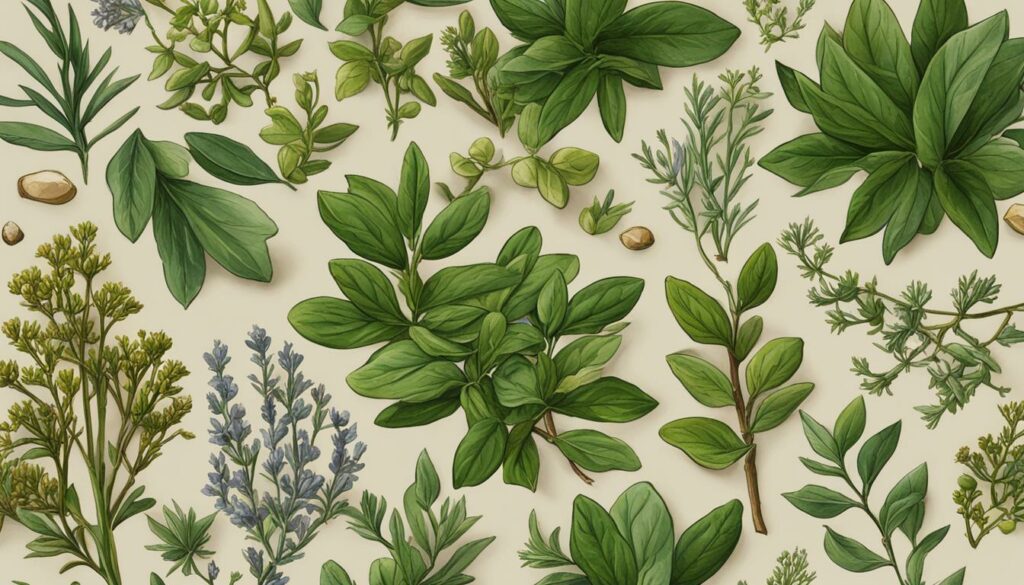Welcome to our article on the uses and benefits of thyme! Thyme is not only a flavorful herb that adds depth to your culinary creations but also a powerhouse of medicinal properties. Loaded with vitamins, minerals, and antioxidants, thyme offers a range of health benefits that can enhance your well-being.
Thyme has been used medicinally for centuries, known for its ability to soothe coughs, boost the immune system, fight infections, reduce inflammation, lower blood pressure, and even prevent acne. Whether you incorporate thyme into your cooking or enjoy it as a fragrant tea, you can unlock its full potential and reap its rewards.
Thyme essential oil is another remarkable product derived from this herb, known for its antibacterial properties and diverse uses. At the heart of it all, thyme offers a holistic approach to health and wellness.
In this article, we will explore the culinary uses of thyme, its role in traditional medicine, and how you can incorporate it into your daily routine. Join us as we delve into the wonderful world of thyme and discover the myriad benefits it has to offer.
Thyme in Culinary Creations: Flavorful and Nutritious
Thyme is a popular culinary herb known for its distinct flavor. It is commonly used in French and Mediterranean cooking and can enhance a variety of savory dishes, including roasts, stews, and sauces.
While thyme adds a delicious taste to your meals, it also provides nutritional benefits. It is rich in vitamins A and C, iron, and fiber. Thyme can be used fresh or dried, and it can even be made into a herbal tea for a soothing and comforting drink.
Incorporating thyme into your culinary creations can not only enhance the flavor but also provide additional nutrients and health benefits.
Here are some culinary uses of thyme:
- Seasoning for roasted meats and vegetables
- Flavor enhancer for soups and stews
- Ingredient in marinades and dressings
- Herb in homemade bread and focaccia
Thyme recipes offer a wide range of possibilities to explore and experiment in the kitchen. Whether you’re a seasoned chef or a novice cook, adding thyme to your dishes can elevate the flavor profile and introduce a dose of culinary creativity.
“Thyme is the herb that smells like sunshine.” – Terri Guillemets
Aside from its culinary uses, thyme tea boasts a range of health benefits. It can aid digestion, soothe coughs, and support the immune system. By steeping a few sprigs of thyme in hot water, you can create a refreshing and aromatic herbal tea that promotes overall well-being.
So, the next time you’re planning your menu or looking to enhance your favorite recipes, consider incorporating thyme. This versatile herb can add both flavor and nutrition to your culinary adventures.

Thyme in Traditional Medicine: Promoting Wellness
Thyme has long been recognized for its remarkable healing properties and has been an integral part of traditional medicine in various cultures. Its inclusion in herbal remedies is attributed to its potent antimicrobial, anti-inflammatory, and antioxidant effects.
One popular way to harness the health properties of thyme is by consuming it in the form of tea. Thyme tea is renowned for its ability to soothe respiratory issues, providing relief from coughs, colds, and congestion. This aromatic herbal infusion is also known to promote overall well-being by supporting immune function and providing a comforting experience.
Thyme essential oil is another notable component of traditional medicine practices. With its antiseptic and antibacterial properties, thyme essential oil is commonly used in natural remedies and topical applications. It can help combat infections, heal wounds, and promote skin health.
Moreover, thyme has been associated with mental health benefits, particularly in alleviating symptoms of mood disorders. The herb’s natural compounds are believed to have a positive impact on emotional well-being and provide a calming effect. Incorporating thyme into your wellness routine can offer a holistic approach to supporting mental health.

Whether consumed as a warm cup of tea or used in essential oil form, thyme holds the potential to contribute to your overall wellness. Its rich history and numerous health benefits make it a valuable addition to your herbal remedies arsenal.
Conclusion
Thyme, a versatile herb, offers a myriad of uses and benefits that can improve your daily life. From enhancing the flavor of your culinary creations to its healing properties in traditional medicine, thyme deserves a place in your routine.
By incorporating thyme into your meals, you not only add a flavorful twist but also introduce a range of nutrients and antioxidants to support your overall health. Whether used fresh or dried, thyme can elevate your dishes to new heights. And don’t forget about thyme tea, which can provide soothing relief and promote wellness.
In traditional medicine, thyme is highly regarded for its antimicrobial and anti-inflammatory effects. Whether consumed as a tea or used in essential oil form, thyme offers natural remedies and support for various health conditions. It can help boost your immune system, soothe respiratory issues, reduce inflammation, and even support mental health.
Embrace the power of thyme and unlock its full potential in your life. From culinary delights to traditional medicine, the benefits of thyme are waiting for you to explore and enjoy. Incorporate thyme into your daily routine and reap the rewards for your health and well-being.
FAQ
How can thyme be used?
Thyme can be used in cooking to enhance the flavor of dishes, made into a herbal tea, or used as an essential oil.
What are the benefits of thyme?
Thyme has numerous health benefits, including soothing coughs, boosting the immune system, fighting infections, reducing inflammation, and lowering blood pressure. It can also be used for skincare and mental health support.
How can thyme be used in culinary creations?
Thyme can be used in a variety of savory dishes, such as roasts, stews, and sauces, to add a delicious flavor. It can be used fresh or dried.
What are the benefits of thyme tea?
Thyme tea can help relieve respiratory issues, promote overall well-being, and provide antioxidant benefits.
How is thyme used in traditional medicine?
Thyme has been used in traditional medicine for centuries due to its antimicrobial, anti-inflammatory, and antioxidant properties. It can be used in the form of tea or essential oil to support various health conditions.
Can thyme be used for skincare?
Yes, thyme essential oil has antibacterial properties and can be used to prevent acne and promote healthy skin.
Are there any mental health benefits of thyme?
Thyme has been associated with alleviating symptoms of mood disorders and promoting mental well-being.

